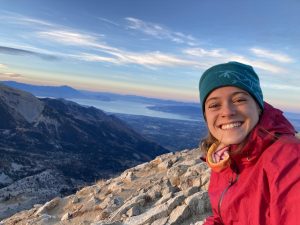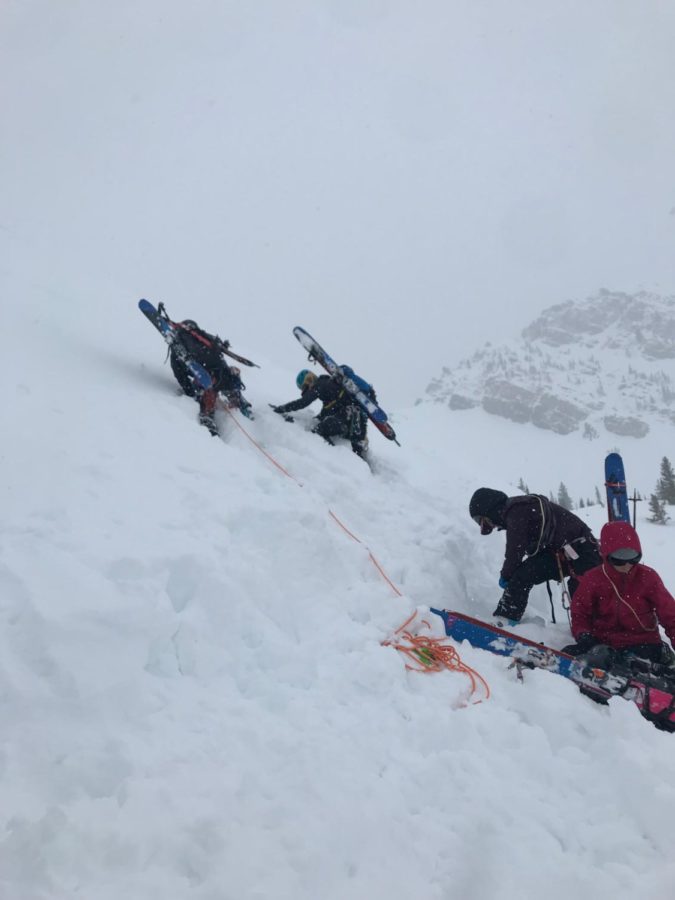Why Outdoor Leadership Is a Prime Path to Follow
Outdoor leadership often insinuates growth on behalf of the people receiving the leadership, however, developing leaders are likely to have transformative experiences as well. I became a trip leader for Outdoor Adventures shortly after beginning my college career at the University of Utah. Through intensive training, shadowing on trips and evening lessons, I obtained more than the technical skills required for safe adventures. Being in a leadership role has taught me how to adapt to unexpected occurrences, obtain a holistic perspective of group scenarios and take better care of myself. I have been able to spread awareness of issues like environmental destruction, and I have started assisting in the process of dismantling inequitable social structures in the outdoors. Outdoor leaders must be well-versed in social facilitation, communication and adaptability, but perhaps the most important outcome for me has been my increased sense of confidence.
Outdoor leadership can lead to other careers in the outdoor industry. Josh Beckner instructs avalanche courses at the U and is the founder and director of the School for International Expedition Training (SIET). SIET is a nonprofit school focused on providing the next step for young leaders who have basic skills and hope to become guides, outdoor educators, or mountaineers. Before creating SIET, Beckner was an instructor for the National Outdoor Leadership School (NOLS), but he wanted to shift into a more financially secure career. Beckner also repeatedly noticed the dangerous habits of young outdoor adventurers. As a frontrunner in the outdoor community, Beckner has had friends who have passed away due to outdoor-related accidents, and Beckner himself has “had some really scary near-misses.” Beckner said he “decided to become a professional hypocrite and tell people they shouldn’t do it the way [he] did it.” Between the goal for communal safety and his personal needs, Beckner was able to fully emotionally invest in the foundations of SIET.
Elizabeth Rogers is an Associate Instructor at the Center for Teaching and Learning Excellence and the Office for Inclusive Excellence. Rogers grew up with a love for the outdoors and took on her first leadership positions as a ski instructor and NOLS instructor. Rogers earned her Ph.D. in Educational Leadership and Policy. Her research focused on gender, social justice and outdoor leadership. In 2006, she forged her own path and started the Westminster Outdoor Program. Unlike Beckner, Rogers’s course has ventured away from direct outdoor applications, but her transition to working at the U was smooth. Within her joint position, Rogers primarily works with faculty members “on inclusive teaching practices, classroom climate, creating community in a classroom and working with diverse student learners.” She continues to use the leadership experiences she acquired from her repertoire of outdoor leadership positions.
Careers in the outdoor industry, like any other field, can present an array of challenges. Beckner personally struggles with the administrative tasks he performs for SIET. “Right now, my living room is covered in receipts and different forms. I’d much rather be outside five days a week, just teaching and guiding, but for me right now that’s impossible,” he said. Beckner also finds challenges in dealing with people who believe “a solid background coming from professional instruction” is unnecessary or overrated. Beckner notices that many students in the Level 1 avalanche courses he teaches often ignore the fact that the course does not “give you the skills you need to go out there and ski really serious objectives.” When instructors vouch for students to register for more courses, students may believe the instructors are trying to capitalize off of them. Beckner understands this conundrum, but he said he believes most instructors simply want their students to be safe.
Another widespread issue that Beckner has personally witnessed is that of inequitable opportunities in the outdoors. “I was hoping that by running a nonprofit, I’d be able to get funding for people that are not able to afford the courses, but it’s pretty hard these days to get donors to chip in to help people become safer in the outdoors,” Beckner said. He pointed out that “philanthropists are more likely to go to the opera than to the mountains,” and are therefore unlikely to understand the benefits of outdoor education. “I think that even if they do go to the mountains, they don’t know how important non-profit outdoor education is in helping people get a handle on technical and risk management skills,” Beckner said.
Rogers’s current and past jobs have dealt with such issues firsthand. “There’s some truth to a lot of the inequities around how nature and land is accessed, but in terms of breaking some down those barriers, it just requires a lot of communication, listening and support around how folks want to experience the outdoors.” Rogers explained that it is essential to create relationships that go beyond formal partnerships. One of Westminster’s relationship-based partnerships is Step Out, which works with Promise South Salt Lake to get youth outside. Rogers also highlighted the importance of acknowledging “how we define the outdoors, and how it might work a little differently from traditional ways of thinking about it.” The silver lining is that the high concentration of challenges that exists in the outdoor industry yields more patient and determined leaders.
Both Beckner and Rogers exemplify the evolution of a path that began with simple leadership jobs. Beckner’s knowledge and passion drove him to expand a branch of the outdoor world and create SIET. Conversely, Rogers has honed in on the issues that matter to her the most and has followed those issues to her most recent position. Regardless of where outdoor leadership takes someone, the groundwork almost always provides an overwhelming sense of community and self-growth. Beckner has had the pleasure of watching his students succeed in their careers after going through SIET. Rogers said that one of her greatest rewards has been “getting [her] own self-confidence as a person and as a leader through outdoor education and being in the wilderness.”
One of the greatest questions an outdoor enthusiast faces is whether or not their pursuits will provide financial stability. The good news is that while a career in outdoor education might not be sustainable for everyone, the knowledge gained through outdoor leadership is applicable to any career. Through the comparatively little work I have done in the outdoor world, I have had saturated experiences that are now a permanent part of my being. My advice to others — get involved in outdoor leadership if you have the means and can do it safely. What you learn will help you grow as a student, coworker and person in any and all relationships.



